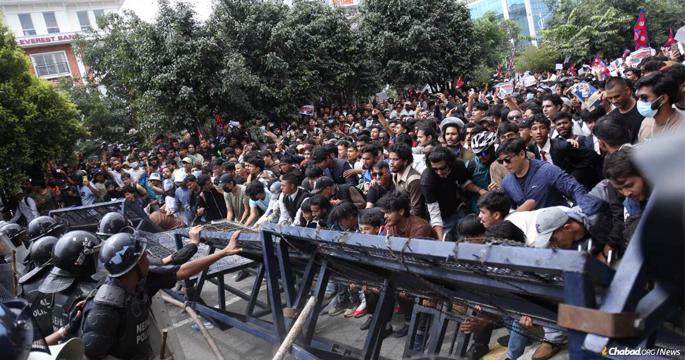
Amid Upheaval in Nepal, Chabad Provides Refuge in Kathmandu
by Bruria Efune – chabad.org
Outside, gunfire cracks through the air and angry shouts echo in the streets, while pillars of smoke rise above the city. Nepal’s violent protests have entered their fifth day, with soldiers now patrolling every corner. Yet within the walls of Chabad-Lubavitch of Kathmandu, an island of calm endures, a place of safety and reassurance amid the chaos.
“It began on Sunday,” Chani Lifshitz tells Chabad.org. “We have been staying inside with our guests since then, and hope that the situation will calm down soon, maybe now that the prime minister and president have resigned.”
The unrest began after Nepal’s government abruptly banned social media platforms, sparking outrage among the Himalayan nation’s young generation. Beneath that trigger lay years of pent-up frustration over corruption, nepotism, and economic stagnation. Tens of thousands of mostly young protesters poured into the streets, accusing leaders of enriching themselves while ordinary citizens struggled.
Demonstrations quickly spiraled into riots: government buildings and offices were torched, vehicles set on fire, and whole neighborhoods were engulfed in smoke. Security forces responded with force, using tear gas, rubber bullets, and live ammunition, which left dozens dead and many more wounded. With curfews now in place and the army patrolling city streets, Nepal has been thrust into one of its most violent political crises in years.
Malchut Choter, an Israeli woman in her 20s, was traveling through Kathmandu when the unrest began.

“I had stopped by Chabad a few days before, and met Rabbi Chezky and Chani Lifshitz,” says Choter. “So when the violence began, and the shops all closed, I knew where to go. I feel safe here, much more than in the hostel. The atmosphere is warm, and you can feel the care throughout the whole Chabad House.”
Choter is one of around 200 Jewish guests from around the world who have turned to Chabad of Nepal for safety. Asked how she and her husband manage to feed all the guests without being able to go outside, Lifshitz said they have their ways.
“We’ve been here in Nepal for over 25 years,” she says. “We’d learned a lot. This isn’t the first time we’ve experienced unrest—we were here during the assassination of the royal family, the war from the Maoist underground movement, and other uprisings. We developed connections around the city. For now we have enough supplies, but when we need more, with G‑d’s help, we’re confident we’ll be able to procure them.”
Lifshitz is less concerned with the lockdown and violence, and more with a specific demographic of her guests.
“Many who come to us come after their military service,” she explains. “They came here to rest and recover. And suddenly all their trauma is triggered again—hearing gunshots, shouting, chaos. We’re taking care of them too. They’re vulnerable, it’s not easy for them. So we’re constantly talking, encouraging. We try to calm them, tell them it will pass soon, and that we’re here with them.”

This is also something that the Chabad Rabbi and Rebbetzin of Nepal have a lot of experience in.
“People come here with so many stories,” says Chani. “This is a place where people arrive searching, carrying struggles and pain. We understood quickly that we needed to learn therapy, deeply, and so we took a lot of training. Now we’ve become experienced in it, we run workshops and classes.” And since the war between Israel and Hamas that started on Oct. 7, 2023, “this has been an increasingly large part of our mission here.”
Lifshitz hopes that the unrest will end before a special trip planned for next week. A group of soldiers who’d lost limbs in battle are scheduled to arrive for a custom hike through the mountains, designed to help them feel alive and strong again.
“But for now we need to focus on those who are here,” asserts Lifshitz. “We need to keep a calm and reassuring air. The atmosphere is very positive and safe, people feel welcome, like a family—that’s how we need it.”

While for many, turning to Chabad was instinctive, at least one guest resisted until he had no choice.
“He’s a young man who grew up in a religious home,” says Lifshitz. “He left that path, and did everything he could to rebel—from large tattoos to pork, you name it. And he swore never to set foot into a religious building again.”
When the unrest began, his friends all went to the Chabad, but he refused—until the danger seemed too overwhelming, and his friends finally convinced him.
“He’s here for a few days now; we welcomed him warmly and later had very deep conversations. He started joining the activities. Now he says he had to run to the other side of the world to return home.”
According to Choter, it’s all natural. “The atmosphere here with Chani and Chezky is amazing. They’re just wonderful people, and the whole complex is full of positive energy and generosity. We barely feel the violence outside. Instead, every kind of Jew walks in and feels at home. I keep hearing it again and again, people saying it’s so good to be with fellow Jews and fellow Israelis.
“It’s so good to be home.”
To partner with the Lifshitzs and support them in their work, click here.












